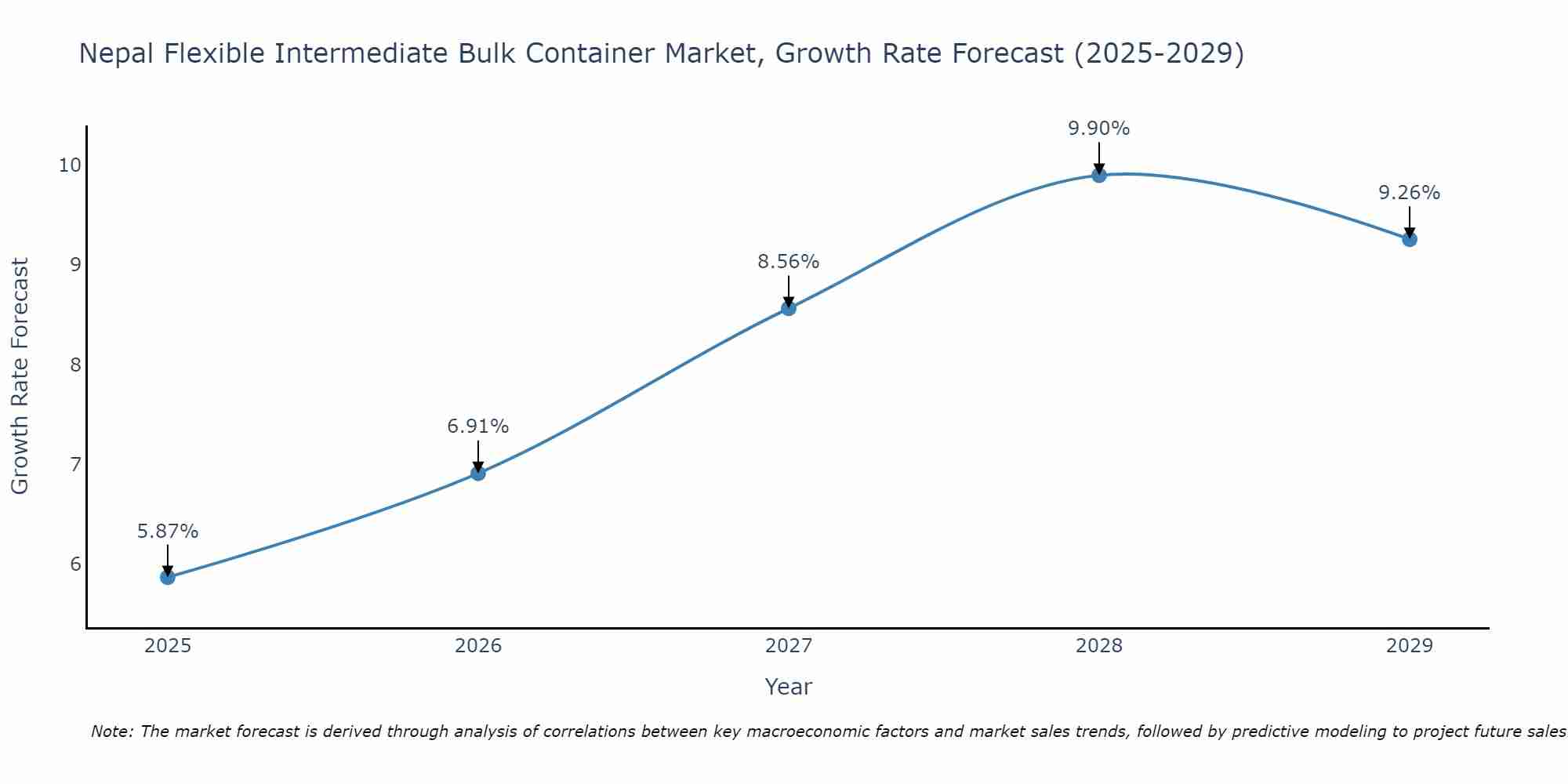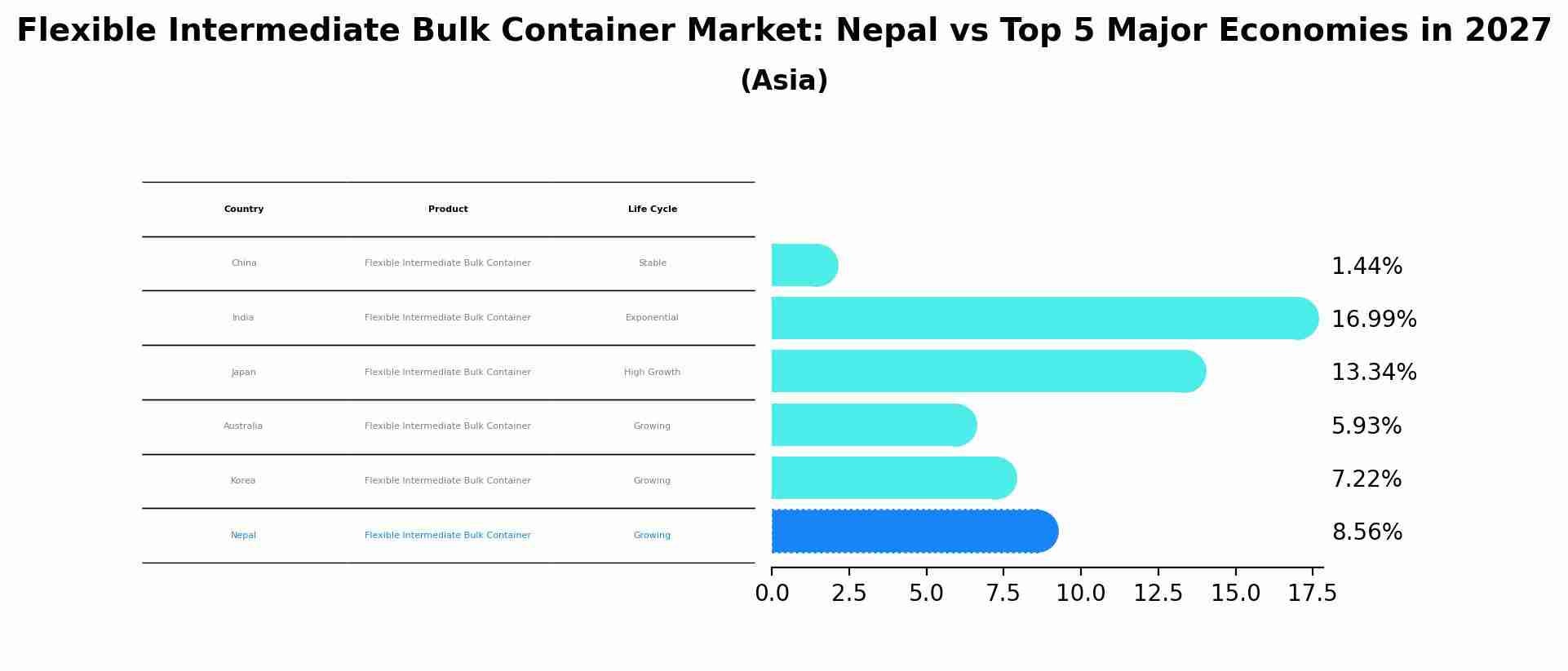Nepal Flexible Intermediate Bulk Container Market (2025-2031) Outlook | Industry, Value, Companies, Analysis, Growth, Revenue, Forecast, Trends, Size & Share
| Product Code: ETC373896 | Publication Date: Aug 2022 | Updated Date: Jul 2025 | Product Type: Market Research Report | |
| Publisher: 6Wresearch | Author: Shubham Padhi | No. of Pages: 75 | No. of Figures: 35 | No. of Tables: 20 |
Nepal Flexible Intermediate Bulk Container Market Size Growth Rate
The Nepal Flexible Intermediate Bulk Container Market is projected to witness mixed growth rate patterns during 2025 to 2029. The growth rate begins at 5.87% in 2025, climbs to a high of 9.90% in 2028, and moderates to 9.26% by 2029.

Flexible Intermediate Bulk Container Market: Nepal vs Top 5 Major Economies in 2027 (Asia)
By 2027, Nepal's Flexible Intermediate Bulk Container market is forecasted to achieve a growing growth rate of 8.56%, with China leading the Asia region, followed by India, Japan, Australia and South Korea.

Nepal Flexible Intermediate Bulk Container Market Synopsis
The Nepal Flexible Intermediate Bulk Container (FIBC) market is experiencing growth driven by factors such as increasing industrial activities, rising demand for efficient packaging solutions, and expanding agricultural sector. FIBCs, also known as bulk bags or big bags, are widely used in various industries for transporting and storing dry bulk materials such as grains, fertilizers, and chemicals. The market is characterized by the presence of both local manufacturers and international players offering a range of FIBC products tailored to meet different customer needs. Key trends in the Nepal FIBC market include the adoption of sustainable and recyclable materials, customization options for specialized applications, and increasing investments in research and development for enhancing product performance and safety standards. Overall, the Nepal FIBC market is poised for further growth as industries seek cost-effective and reliable packaging solutions.
Nepal Flexible Intermediate Bulk Container Market Trends
The Nepal Flexible Intermediate Bulk Container (FIBC) market is experiencing significant growth due to the rising demand for efficient and cost-effective bulk packaging solutions across various industries such as agriculture, chemicals, and construction. Key trends in the market include the increasing adoption of FIBCs for transporting and storing bulk materials, the development of customized FIBCs to meet specific industry requirements, and the growing focus on sustainable and eco-friendly FIBC solutions. Additionally, advancements in FIBC designs and materials, such as anti-static coatings and UV protection, are enhancing the durability and safety of FIBCs in the Nepal market. Overall, the Nepal FIBC market is projected to continue expanding as industries increasingly recognize the benefits of FIBCs for handling and transporting bulk goods efficiently.
Nepal Flexible Intermediate Bulk Container Market Challenges
In the Nepal Flexible Intermediate Bulk Container (FIBC) market, some of the challenges faced include limited awareness and understanding of the benefits of FIBCs among end-users, leading to a slower adoption rate compared to traditional packaging solutions. Additionally, the lack of standardized regulations and quality control measures in the industry can result in inconsistent product quality and reliability, impacting customer trust and satisfaction. Infrastructure limitations and logistical challenges in remote areas of Nepal also pose obstacles to the distribution and supply chain of FIBCs. Finally, competition from alternative packaging solutions and the presence of counterfeit or low-quality products in the market further complicate the landscape for FIBC manufacturers and suppliers in Nepal. Addressing these challenges will be crucial for the sustainable growth and development of the FIBC market in Nepal.
Nepal Flexible Intermediate Bulk Container Market Investment Opportunities
Investment opportunities in the Nepal Flexible Intermediate Bulk Container (FIBC) market are promising due to the growing demand for bulk packaging solutions across industries such as agriculture, construction, and chemicals. The market is witnessing increasing adoption of FIBCs for their cost-effectiveness, efficiency in handling and transportation, and eco-friendliness. As Nepal continues to develop its infrastructure and manufacturing sector, the demand for FIBCs is expected to rise, presenting opportunities for investors to capitalize on this trend. Investing in FIBC manufacturing facilities, distribution networks, and innovative product development tailored to the specific needs of the Nepalese market could yield significant returns in the long term. Additionally, partnerships with local businesses and strategic alliances with key players in the industry can further enhance the investment potential in the Nepal FIBC market.
Jordan Agar Market Government Policies
The Nepal government has implemented policies to regulate the Flexible Intermediate Bulk Container (FIBC) market in the country. These policies include quality standards for FIBC manufacturing, import, and export regulations, as well as environmental guidelines for disposal and recycling of used FIBCs. The government also encourages local production of FIBCs to boost domestic manufacturing capabilities and reduce reliance on imports. Additionally, there are initiatives to promote innovation and technology adoption in the FIBC industry to enhance product quality and competitiveness in the global market. Overall, the government`s policies aim to ensure the sustainable growth of the FIBC market in Nepal while maintaining environmental and quality standards.
Nepal Flexible Intermediate Bulk Container Market Future Outlook
The Nepal Flexible Intermediate Bulk Container (FIBC) market is expected to show steady growth in the coming years due to increasing demand from industries such as agriculture, construction, and chemicals. Factors such as the growing awareness of the benefits of FIBCs in terms of cost-effectiveness, ease of handling, and environmental sustainability are driving market growth. Additionally, the government`s initiatives to promote the use of eco-friendly packaging solutions are expected to further boost the market. With the expansion of industries and the rise in international trade activities in Nepal, the demand for FIBCs is likely to increase, creating opportunities for market players to innovate and expand their product offerings to cater to diverse industry needs. Overall, the future outlook for the Nepal FIBC market appears promising with a positive growth trajectory anticipated in the coming years.
Key Highlights of the Report:
- Nepal Flexible Intermediate Bulk Container Market Outlook
- Market Size of Nepal Flexible Intermediate Bulk Container Market, 2024
- Forecast of Nepal Flexible Intermediate Bulk Container Market, 2031
- Historical Data and Forecast of Nepal Flexible Intermediate Bulk Container Revenues & Volume for the Period 2021 - 2031
- Nepal Flexible Intermediate Bulk Container Market Trend Evolution
- Nepal Flexible Intermediate Bulk Container Market Drivers and Challenges
- Nepal Flexible Intermediate Bulk Container Price Trends
- Nepal Flexible Intermediate Bulk Container Porter's Five Forces
- Nepal Flexible Intermediate Bulk Container Industry Life Cycle
- Historical Data and Forecast of Nepal Flexible Intermediate Bulk Container Market Revenues & Volume By Product for the Period 2021 - 2031
- Historical Data and Forecast of Nepal Flexible Intermediate Bulk Container Market Revenues & Volume By Type A for the Period 2021 - 2031
- Historical Data and Forecast of Nepal Flexible Intermediate Bulk Container Market Revenues & Volume By Type B for the Period 2021 - 2031
- Historical Data and Forecast of Nepal Flexible Intermediate Bulk Container Market Revenues & Volume By Type C for the Period 2021 - 2031
- Historical Data and Forecast of Nepal Flexible Intermediate Bulk Container Market Revenues & Volume By Type D for the Period 2021 - 2031
- Historical Data and Forecast of Nepal Flexible Intermediate Bulk Container Market Revenues & Volume By End-Use for the Period 2021 - 2031
- Historical Data and Forecast of Nepal Flexible Intermediate Bulk Container Market Revenues & Volume By Food for the Period 2021 - 2031
- Historical Data and Forecast of Nepal Flexible Intermediate Bulk Container Market Revenues & Volume By Chemical for the Period 2021 - 2031
- Historical Data and Forecast of Nepal Flexible Intermediate Bulk Container Market Revenues & Volume By Pharmaceuticals for the Period 2021 - 2031
- Historical Data and Forecast of Nepal Flexible Intermediate Bulk Container Market Revenues & Volume By Others for the Period 2021 - 2031
- Nepal Flexible Intermediate Bulk Container Import Export Trade Statistics
- Market Opportunity Assessment By Product
- Market Opportunity Assessment By End-Use
- Nepal Flexible Intermediate Bulk Container Top Companies Market Share
- Nepal Flexible Intermediate Bulk Container Competitive Benchmarking By Technical and Operational Parameters
- Nepal Flexible Intermediate Bulk Container Company Profiles
- Nepal Flexible Intermediate Bulk Container Key Strategic Recommendations
Frequently Asked Questions About the Market Study (FAQs):
- Single User License$ 1,995
- Department License$ 2,400
- Site License$ 3,120
- Global License$ 3,795
Search
Related Reports
- ASEAN Bearings Market (2025-2031) | Strategy, Consumer Insights, Analysis, Investment Trends, Opportunities, Growth, Size, Share, Industry, Revenue, Segments, Value, Segmentation, Supply, Forecast, Restraints, Outlook, Competition, Drivers, Trends, Demand, Pricing Analysis, Competitive, Strategic Insights, Companies, Challenges
- Europe Flooring Market (2025-2031) | Outlook, Share, Industry, Trends, Forecast, Companies, Revenue, Size, Analysis, Growth & Value
- Saudi Arabia Manlift Market (2025-2031) | Outlook, Size, Growth, Trends, Companies, Industry, Revenue, Value, Share, Forecast & Analysis
- Uganda Excavator, Crane, and Wheel Loaders Market (2025-2031) | Strategy, Consumer Insights, Analysis, Investment Trends, Opportunities, Growth, Size, Share, Industry, Revenue, Segments, Value, Segmentation, Supply, Forecast, Restraints, Outlook, Competition, Drivers, Trends, Demand, Pricing Analysis, Competitive, Strategic Insights, Companies, Challenges
- Rwanda Excavator, Crane, and Wheel Loaders Market (2025-2031) | Strategy, Consumer Insights, Analysis, Investment Trends, Opportunities, Growth, Size, Share, Industry, Revenue, Segments, Value, Segmentation, Supply, Forecast, Restraints, Outlook, Competition, Drivers, Trends, Demand, Pricing Analysis, Competitive, Strategic Insights, Companies, Challenges
- Kenya Excavator, Crane, and Wheel Loaders Market (2025-2031) | Strategy, Consumer Insights, Analysis, Investment Trends, Opportunities, Growth, Size, Share, Industry, Revenue, Segments, Value, Segmentation, Supply, Forecast, Restraints, Outlook, Competition, Drivers, Trends, Demand, Pricing Analysis, Competitive, Strategic Insights, Companies, Challenges
- Angola Excavator, Crane, and Wheel Loaders Market (2025-2031) | Strategy, Consumer Insights, Analysis, Investment Trends, Opportunities, Growth, Size, Share, Industry, Revenue, Segments, Value, Segmentation, Supply, Forecast, Restraints, Outlook, Competition, Drivers, Trends, Demand, Pricing Analysis, Competitive, Strategic Insights, Companies, Challenges
- Israel Intelligent Transport System Market (2025-2031) | Strategy, Consumer Insights, Analysis, Investment Trends, Opportunities, Growth, Size, Share, Industry, Revenue, Segments, Value, Segmentation, Supply, Forecast, Restraints, Outlook, Competition, Drivers, Trends, Demand, Pricing Analysis, Competitive, Strategic Insights, Companies, Challenges
- Uganda Precast and Aggregate Market (2025-2031) | Strategy, Consumer Insights, Analysis, Investment Trends, Opportunities, Growth, Size, Share, Industry, Revenue, Segments, Value, Segmentation, Supply, Forecast, Restraints, Outlook, Competition, Drivers, Trends, Demand, Pricing Analysis, Competitive, Strategic Insights, Companies, Challenges
- Australia IT Asset Disposal Market (2025-2031) | Strategy, Consumer Insights, Analysis, Investment Trends, Opportunities, Growth, Size, Share, Industry, Revenue, Segments, Value, Segmentation, Supply, Forecast, Restraints, Outlook, Competition, Drivers, Trends, Demand, Pricing Analysis, Competitive, Strategic Insights, Companies, Challenges
Industry Events and Analyst Meet
Our Clients
Whitepaper
- Middle East & Africa Commercial Security Market Click here to view more.
- Middle East & Africa Fire Safety Systems & Equipment Market Click here to view more.
- GCC Drone Market Click here to view more.
- Middle East Lighting Fixture Market Click here to view more.
- GCC Physical & Perimeter Security Market Click here to view more.
6WResearch In News
- Doha a strategic location for EV manufacturing hub: IPA Qatar
- Demand for luxury TVs surging in the GCC, says Samsung
- Empowering Growth: The Thriving Journey of Bangladesh’s Cable Industry
- Demand for luxury TVs surging in the GCC, says Samsung
- Video call with a traditional healer? Once unthinkable, it’s now common in South Africa
- Intelligent Buildings To Smooth GCC’s Path To Net Zero













